How to Include Thesis in Resume
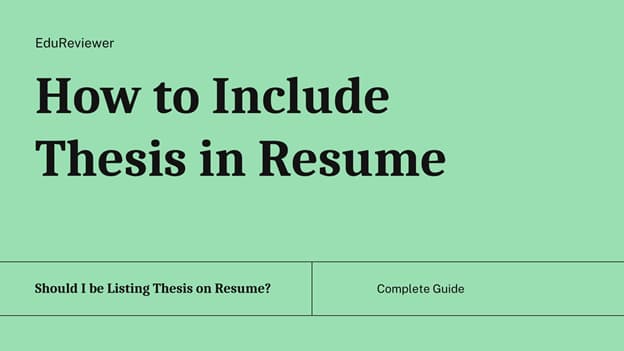
Do you feel that every time you apply for a job, you feel a lot of pressure and uncertainty? If you are tired of not getting a job interview, then you need to be ready to change something. Logically, the best method would be to improve your knowledge and skills.
However, if they already are at the highest level, then there is something wrong with your resume!
Fortunately for you, multiple options are in front of you, and it is up to you whether you will choose the best one. One thing that will certainly raise your chances of getting a job interview is to put a thesis on your resume. It is a document that confirms your expertise in a particular topic.
Also, you can check this fantastic read about how you should list patents on your resume. But, how to put a thesis on a resume?
Answering that question in one or two sentences is not easy. That is the reason why we decided to provide you with an in-depth guide on how to list a thesis on a resume. We strongly recommend you analyze each tip from the list and apply those that seem most suitable to your career ambitions and goals!

4 Tips on How to Include Thesis on Resume
As you could conclude on your own from the subheading, there are four different ways you can complete this part of the job. Moreover, four different parts of the document you submit are ideal for something like this. Let’s find them out together!
Presenting your thesis effectively on your resume is crucial for the positions you apply for. However, optimizing your resume requires more effort, and our resumesolution reviews can offer valuable insights. Learn more about how ResumeSolution can make your application stand out.
1. Include a Thesis in Resume Education Section
We will start the list with the most common method people use for adding a thesis to their resume. The education section is the ideal place to add a piece of information like this. All you will have to figure out on your own how connected your thesis is with the job position you are applying for.
In case you see there is a strong connection, then you should add more details. For instance, you can say more about the achievements you had, mention the name and the title of the advisor you worked with, etc. On the other hand, if there is no strong bond between the job position and the thesis you possess, then it is going to be enough to add the name and location of the institution as well as the period of education. Everything else is going to be irrelevant to the hiring manager.
2. Include Your Thesis in the Work Experience Section
Another place where you can put a thesis in your resume is the work experience section. However, this time, adding a thesis to your resume is going to be a bit more demanding as you will have to be a bit more creative.
In this section, you will have to create some sort of subheading where you will describe all the projects you worked on. But, the question is – how to list research on a resume ? How difficult is that?
Don’t write a lot of pieces of information there as your document won’t be eye-pleasing that way. Instead of that, you should only highlight a couple of relevant pieces of information there
- Name of the research project/job title
- The name of the institution where you worked
- More information about your supervisor
- The period you worked there
- All the duties, responsibilities, and achievements that can confirm your expertise
As you see, including a thesis on a resume this way is a bit more challenging. However, work experience is usually at the top of the document. Because of that, there is a big chance you will make your expertise more visible by applying this tip.
3. Write about Thesis In Skills Section
Research programs you worked on as a student will certainly help you put a senior thesis on your resume. However, as mentioned, if you decide to put that in the education section, there is no need to talk about a bunch of details. Instead of that, if you want to talk about skills you got there, there is a separate section where you can do that.
Dividing the skills section is the best thing you can do. One subheading should contain all the hard skills you gained through the research you had. On the other hand, there should also be one subheading dedicated to soft skills you improved during that period. Listing a thesis on a resume that way will certainly raise your chances of getting a job interview.
4. Include a Thesis in the Resume Summary Section
All the pieces of advice we mentioned above are going to be valuable for each candidate. We only suggest you put into consideration your career ambitions and goals as well as the job position you are applying for. The answer on how to include a thesis in resume in the best possible way will appear after that.
Yet, as a rule of thumb, all the hiring managers will primarily check the summary of the document. Because of that, whichever method you decide on, not mentioning this information at the beginning of the document would be a huge mistake!
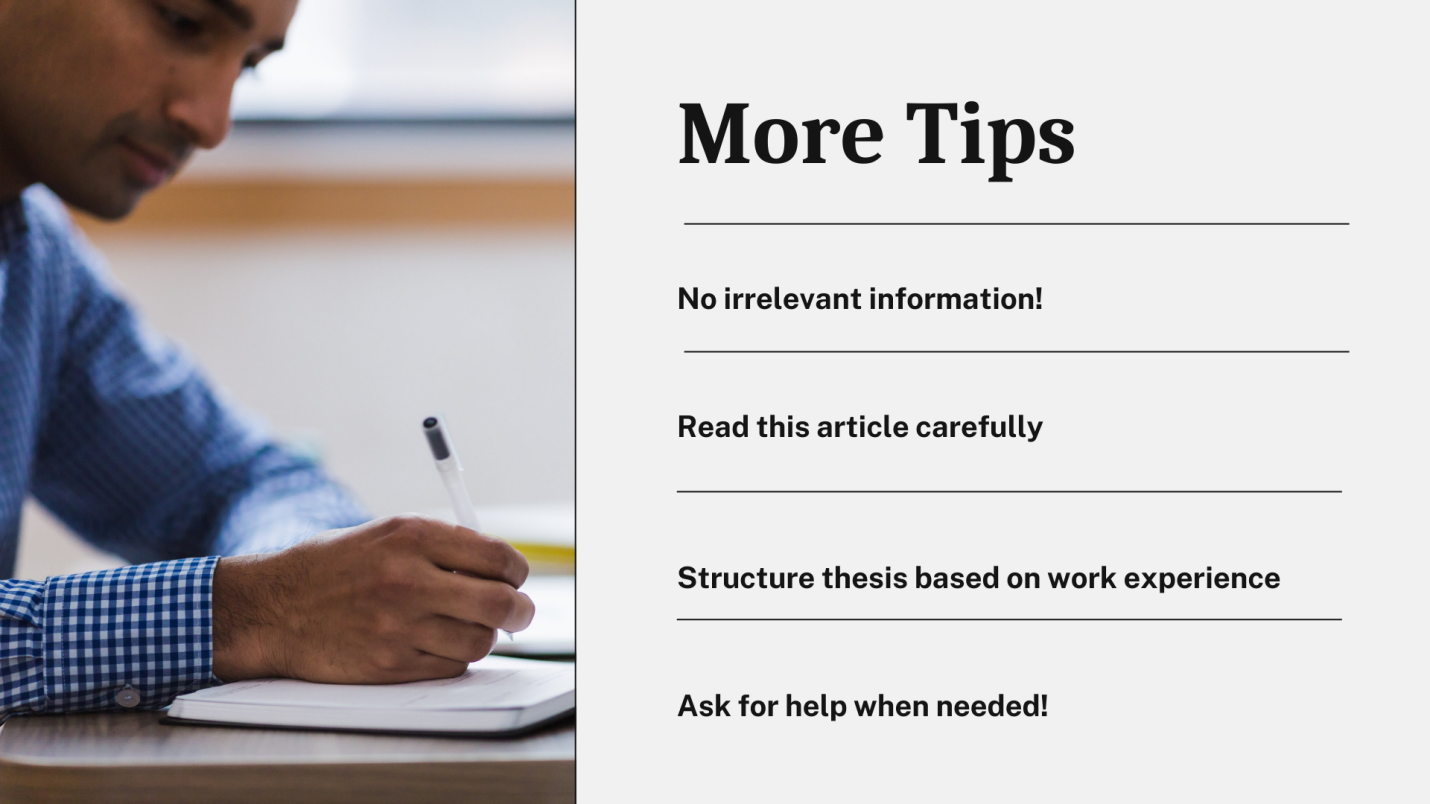
You probably feel right now that you know how to mention your thesis in resume. But, if you truly strive to achieve the best results, then we have some additional information for you! Continue reading if you want to get more valuable pieces of advice!
Avoid Adding Irrelevant Information
People that know how to include a thesis on a resume will always follow the standards! More precisely, they will never add irrelevant pieces of information to boost the word count of their resume. As a rule of thumb, the resume should not be longer than 2 pages. That especially counts for the job positions that a big number of people are applying for. Hiring managers will not have enough time to check all the details of every document they get.
Structure Your Thesis Resume Based on Your Work Experience
We already mentioned that the work experience section is usually the first one after the resume summary. However, that is not the standard that all candidates should strictly follow. If you recently graduated and you lack work experience, then the education section should first appear in the resume. Moreover, the education section is the ideal place to put an honor thesis on a resume.
But, if you have at least three years of work experience, then there is no need to use that structure. Start your story with a work history where you will mention your research projects. After that, add the skills you gained in the Skills Section in the way we previously suggested.
Use Assistance If You Can’t Handle the Obstacles
Even after reading all the pieces of advice, we shared here, some people may not manage to figure out how to put honors thesis on a resume. Because of that, looking for assistance is going to be a smart move.
Keep in mind that the average job-seeking process usually lasts around 5 months . If you want to speed up the entire process, hiring a professional resume writing service will certainly pay off. However, don’t do that immediately! Check out how actually creative you are by exploring how to put a senior thesis on your resume. Giving up immediately should not be your habit!
When Should People Put Thesis on Resume?
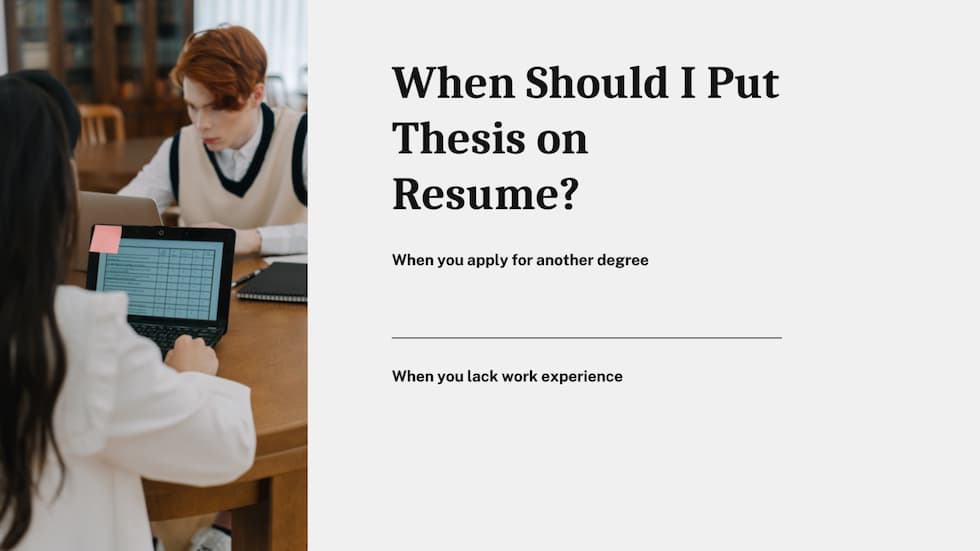
No, the answer to the question from the subheading is not “always”. There are particular scenarios when including a thesis on the resume is extremely important. Let’s find them out together!
Whenever a Candidate Applies for Another Degree
Many people do not stop with their education after they conclude their master’s degree. If you are applying for a Ph.D. program, then adding more information about your thesis to your resume would be an amazing thing. If you manage to get Ph.D. ABD, your chances of getting an interview invitation would raise even more! However, we will not analyze how to list Ph.D. ABD on resume in this article; you will manage to find a bunch of posts online analyzing that subject.
Lack of Work Experience
We already analyzed this, so there is no need to talk too much. If you lack work experience, then highlighting your education and confirming your expertise that way is the only option you have. Hiring managers will understand the “flaws” you have, but they will recognize the potential that you have to become a perfect employee one day!
When It Is Not Connected with Job Description/Requirements
Okay, you already know that putting a thesis on a resume is essential if it is relevant for the job position you apply for. However, there are some moments when you can add this piece of information even if it is not connected with the requirements of the company. Some people want to prove their transferable skills with their thesis. Because of that, if you gained skills like time management, work ethic, communication skills, and others, adding a thesis to the skills section would be good!
Matthew T. Cross, an expert that even wrote books about resume writing said an amazing thing.
He said – “No one will ever create a perfect resume on his first try”.
Because of that, do not be desperate if everything you just read seems confusing and challenging. You will probably get refused many times until you realize how to write a kickass resume.
If you need assistance, writing services are always available online. The professionals will know how to boost the quality of the document and represent your skills and mentality in the best possible way. So, are you ready to start this amazing journey? If you need help with your resume writing, then check here our list of the top resume writers online and be sure that you have perfect documents.

Education Writer
One of our team members is Alina Burakova. She has vast experience in reviewing career and education-related websites. Being a little shy, Alina dislikes writing about herself too much, so here is her short bio. In 2010, she graduated from ...
Relevant articles

If you have a security clearance that’s active or you had it earlier in your career at some point, you might be wondering how to list security clearance on your resume. It may all sound like something that’s not very easy, but it does not have to be that way. Here, you will find all…
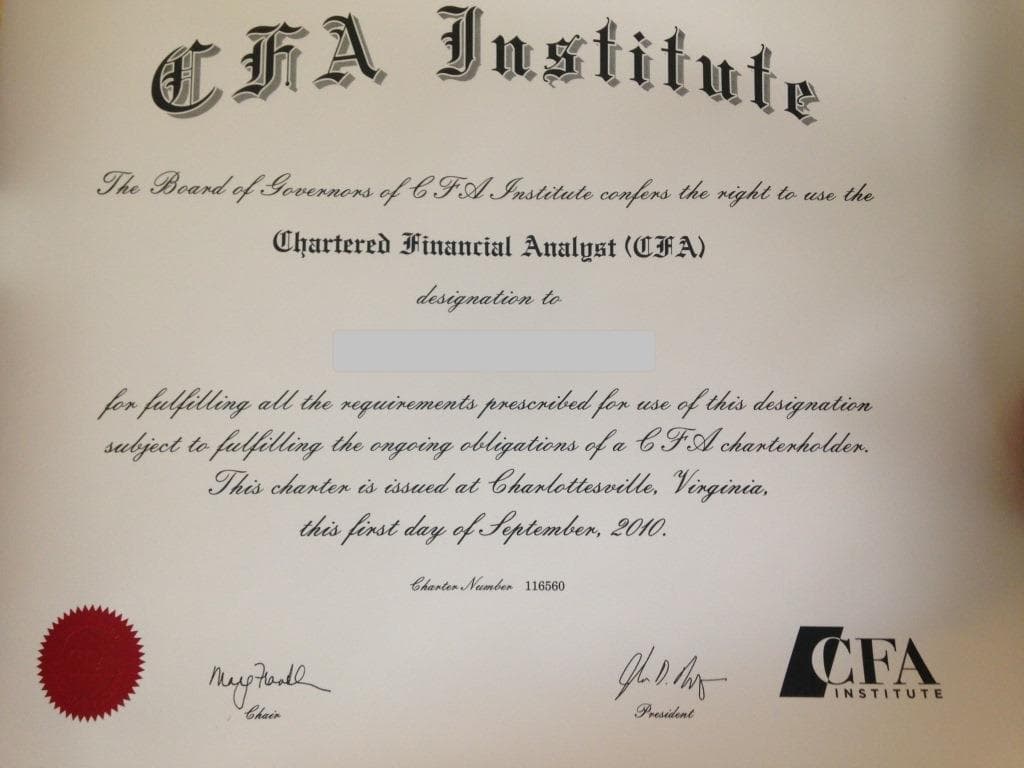
It is nice if you are a highly skilled person with good grades and college and long work experience. You can be sure all the potential employers will appreciate that. Despite that, they will certainly consider you if you possess some valuable personal characteristics such as loyalty, responsibility, etc. But, will you a unique “sample”…
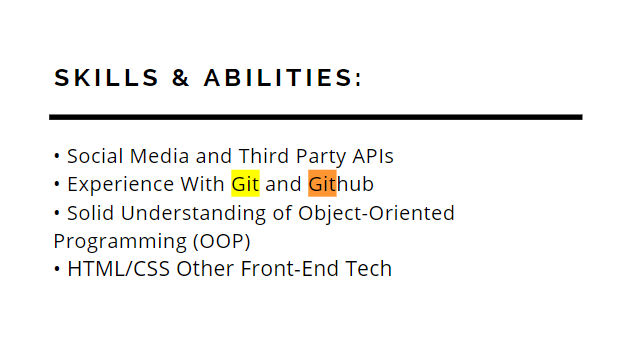
Getting a job is a task full of uncertainty. Before you impress the potential employers and hiring managers on the job interview, your task is to convince them to invite you to such a meeting. The only way to do that is to write an impressive resume that will split you from the mass of…
Your email address will not be published. Required fields are marked *
Resume Writing CompTIA Certification on Resume: How to Put It [+Examples]
Resume Writing Can You Put Udemy On Resume?
Admission Consulting The Five Best Graduate School Admissions Consultants Reviewed

How to Put Your Thesis on a Resume
In This Guide:
When it's appropriate to feature your thesis in a resume
A template and example on how to feature a thesis on your resume
Tips to list your thesis on your resume.

A thesis is a statement that explains the general point of a project. Typically, this statement gives the reader a clear idea of the primary points so they can have more context when working through the information to follow. It may also offer a definitive hypothesis, statement, or personal perspective.
The thesis also refers to an academic project that a doctoral candidate completes in pursuit of their professional qualification. We’ll focus on that usage today, looking at how to add this project to a resume.
In this article, you’ll learn
- When it’s appropriate to add a thesis to a resume
- Tips on adding your thesis to a resume
- Key takeaways
When it's appropriate to feature your thesis in a resume
Here are a few instances when you should add your thesis to your resume.
When applying for another degree
Thesis work looks good when you’re applying for other programs. It shows that you’re familiar with academic coursework and have completed significant challenges in your field.
When it’s relevant to the position
A thesis shows that you’ve earned specialized knowledge. When that knowledge pertains to a certain position, the employer must know that. Even if the relevance is a slight stretch, it’s still worth citing on your resume.
When you want to show transferable skills
Gaining a thesis requires refined skills. Those skills are likely transferable . Isolate those skills and think of ways they could apply to your intended position. If the skills relate directly, that’s a great reason to add the thesis to your resume.
Let’s see how you could add your thesis to a resume . It might be challenging to figure out where you should add the information. The following examples should give you some perspective.
Example of a thesis on a resume
Here’s an example of how to cite your thesis under “relevant experience.”
Doctoral Thesis
March 2019 - january 2020.
Produced an accepted thesis on the function of microorganisms in the onset of heart disease. Worked closely with University faculty to achieve insights that have since saved lives. Utilized intense research, communication, and organizational skills to complete the project.
A few concise sentences about impact, structure, and the effort required will help display the work you’ve done.
A thesis on resume template
You could cite your thesis in numerous places in your resume. However, it’s smart to find one place and stick to it.
In a template , you might find space for your thesis under “work experience,” “professional experiences,” “education,” or somewhere in an introduction.
Here are a few things you could note in your description of the thesis.
Make sure to mention your GPA
Your GPA holds a lot of weight. Noting that you could finish a thesis and maintain a solid GPA is smart. You can also note any grading that came from your thesis work, specifically.
List relevant research projects
Cite particular research projects that occurred within your thesis work. These will all highlight different skills or unique knowledge that you have.
A key thing to remember is that you can apply skills gained while earning your thesis. You can also use your thesis in numerous areas of the resume.
Understanding how to add a thesis to your resume intelligently can help you stand out and utilize the skills you gained through your doctoral process.

- Resume Guides
8 Example Situational Interview Questions And Their Answers
Effectively showcasing basic knowledge on your resume, how to list multiple jobs at the same company on a resume, spot the red flags: how to know if a job is a scam, how to answer "what motivates you" interview question (with examples), the success journey: marissa mayer’s pre-yahoo resume.
- Create Resume
- Terms of Service
- Privacy Policy
- Cookie Preferences
- Resume Examples
- Resume Templates
- AI Resume Builder
- Resume Summary Generator
- Resume Formats
- Resume Checker
- Resume Skills
- How to Write a Resume
- Modern Resume Templates
- Simple Resume Templates
- Cover Letter Builder
- Cover Letter Examples
- Cover Letter Templates
- Cover Letter Formats
- How to Write a Cover Letter
- Cover Letter Guides
- Job Interview Guides
- Job Interview Questions
- Career Resources
- Meet our customers
- Career resources
- English (UK)
- French (FR)
- German (DE)
- Spanish (ES)
- Swedish (SE)
© 2024 . All rights reserved.
Made with love by people who care.
- Get the Job
- Resumes and CVs
- Applications
- Cover Letters
- Professional References
Professional Licenses and Exams
- Get a Promotion
- Negotiation
- Professional Ethics
- Professionalism
- Dealing with Coworkers
- Dealing with Bosses
Communication Skills
Managing the office, disabilities, harassment and discrimination, unemployment.
- Career Paths
- Compare Careers
- Switching Careers
- Training and Certifications
- Start a Company
- Internships and Apprenticeships
- Entry Level Jobs
- College Degrees
Growth Trends for Related Jobs
How to put a master's thesis to work in a resume.

Having a master's degree in a particular field already demonstrates that you have extensive knowledge in that subject area -- but adding information about your master's thesis on your resume can help drive the point home even more. It's especially helpful to include information about your thesis on the resume if that thesis relates closely to the job for which you're now applying -- but in any case, it's worth including it in your resume's "Education" section.
Where to Include the Thesis
In the "Education" section of your resume, list the schools you've attended in reverse chronological order . Start with the name of the institution, followed by the degree you earned and the area or subject you specialized in. If you're trying to save space, type "Thesis:" on the same line, and then include the title of your master's thesis . If you have available space -- or you want to make the information about your thesis stand out more for the employer -- skip a line under the basic information about your master's degree, hit "Tab" on your keyboard to create an indentation, and then type "Masters Thesis:" followed by its title. For even more emphasis, type one succinct line describing the nature of the thesis. To make it stand out even more, describe particular points from the thesis in your job application cover letter.
Related Articles
Proper format for an associate's degree on a resume →.

How to List Master's Degrees on a Resume →

How to Write a CV Sample →

How to Put a Bachelor's Degree on a Resume →

How to List Professional Development on a Resume →

How to List Education on Resume →

- Purdue Online Writing Lab: Education Section
- University of California Berkeley Career Center: CV - Part 2 - The Elements and How To Put Them Together
Nicole Vulcan has been a journalist since 1997, covering parenting and fitness for The Oregonian, careers for CareerAddict, and travel, gardening and fitness for Black Hills Woman and other publications. Vulcan holds a Bachelor of Arts in English and journalism from the University of Minnesota. She's also a lifelong athlete and is pursuing certification as a personal trainer.
Design Pics/Design Pics/Getty Images
- Job Descriptions
- Law Enforcement Job Descriptions
- Administrative Job Descriptions
- Healthcare Job Descriptions
- Sales Job Descriptions
- Fashion Job Descriptions
- Education Job Descriptions
- Salary Insights
- Journalism Salaries
- Healthcare Salaries
- Military Salaries
- Engineering Salaries
- Teaching Salaries
- Accessibility
- Privacy Notice
- Cookie Notice
- Copyright Policy
- Contact Us
- Find a Job
- Manage Preferences
- California Notice of Collection
- Terms of Use
Explore Jobs
- Jobs Near Me
- Remote Jobs
- Full Time Jobs
- Part Time Jobs
- Entry Level Jobs
- Work From Home Jobs
Find Specific Jobs
- $15 Per Hour Jobs
- $20 Per Hour Jobs
- Hiring Immediately Jobs
- High School Jobs
- H1b Visa Jobs
Explore Careers
- Business And Financial
- Architecture And Engineering
- Computer And Mathematical
Explore Professions
- What They Do
- Certifications
- Demographics
Best Companies
- Health Care
- Fortune 500
Explore Companies
- CEO And Executies
- Resume Builder
- Career Advice
- Explore Majors
- Questions And Answers
- Interview Questions

How To Put Research On Your Resume (With Examples)
- How To Write A Resume
- How To Build A Resume
- Specific Resume Words
- Action Verbs On A resume
- Words To Describe Yourself
- Resume Outline
- How To Make A Resume
- How To Make A Resume On Word
- How To Write A Resume Profile
- General Resume Examples
- Resume With No Experience
- Student Resume
- College Resume
- Entry Level Resume
- Military Resume
- Internship Resume
- First Resume
- College Application Resume
- 2 Page Resume
- Blank Resume Template
- College Freshman Resume
- Work History
- Resume Templates
- Resume Tips
- Best Resume Writing Services
- Things To Avoid On A Resume
- Resume Paper To Use
- What To Include In A Resume
- How To Write A Bio
- How To Write A Personal Statement
- Lied on Your Resume?
- Avoid Age Discrimination
- Words and Phrases You Shouldn't Include in Your Resume
- How Many Skills Should You List On A Resume
- Send A Resume As A Pdf
- Resume Critique
- Make A Resume Stand Out
- Resume Spelling
- Resume Past Or Present Tense
- How To List Projects On A resume
- Best Resume Action Words
- How To Quantify Your Resume
- Resume Bullet Points
- Are Resume Writers Worth It
- How Many Jobs To List On Resume
- Please Find Attached My Resume
- How To List Contract Work On Your Resume
- How To Put Research On Your Resume
- What Is A CV?
- CV Vs Resume
- CV Templates
- CV Examples
Find a Job You Really Want In
Research experiences and skills are an incredibly important aspect of many job applications, so it’s important to know how to put them on your resume correctly. Hiring managers and recruiters want employees who can help drive innovation by being able to apply research skills to problem solve and come up with creative growth solutions.
If you’re a job seeker looking to include your research skills on a resume , we’ll go over how to list research on resume, where you can include it on a resume, and give you some examples.
Key Takeaways:
If you don’t have traditional research experience, highlight the skills used for research that you’ve used in past jobs.
Consider creating a separate research section in your resume if you have a lot of research experience or merge sections, depending on which section you want to bolster with research.
Research experience is one of the best assets to include on a resume so be on the lookout for more opportunities.

What are research skills?
Where to put research experience on your resume
How to include research on your resume, examples of research on a resume, how to put research on your resume faq.
- Sign Up For More Advice and Jobs
Research skills are any skills related to your ability to locate, extract, organize, and evaluate data relevant to a particular subject. It also involves investigation, critical thinking , and presenting or using the findings in a meaningful way.
Depending on what job you’re applying for, research skills could make or break your ability to land the job. Almost every job requires some research skills and you probably already have some of those skills mastered by now.
For most careers, research is a vital process to be able to answer questions. “Research skills” are not a single skill, but multiple ones put together.
Some skills that are necessary for research are organization, problem-solving, critical thinking, communication, and specific technical skills, like coding, Excel, and copywriting.
Including research experience and skills on a resume can be incredibly flexible. When thinking about how to add it to your resume, you want to consider how the research experience adds to your resume.
Your research experience can be included in a few different sections of your resume. Some of those sections include:
Academic accomplishments
Research experience
Work experience/history
College activities
Volunteer work
Presentations and publications
Skills section
If you’ve had smaller research roles but no “official” research experience, you can highlight the skills associated with the types of research mentioned above in your job description under the work history section in your resume.
If your job history is a research position, then naturally, you would include research under the work history section. You can also merge your sections depending on what type of position you are applying for.
For example, you could create a “Research and Education” section or a “Research and Publications” section. If your research is not related to your education and you don’t have any publications, you can also detail it in a separate “Research” section in your resume.
To include your research on your resume, you should gather all the necessary information and then quantify your accomplishments to fit into specific sections. Here is a more detailed list of how to write about research experience in resume:
Gather all the necessary information. The first step is to collect all of the important details like the title of the research project, the location of the research project, the principal investigator of the project (if applicable), and the dates of the project. You will list these details much like you would list a company you have worked for in the past.
Read the job description carefully. Every resume and cover letter you write should be tailored to the job you’re applying for. When a hiring manager puts a necessary qualification in their job posting, you must be sure to include it in your resume.
Make sure that you highlight the right types of research skills on your job applications and resumes.
Quantify your accomplishments. When describing your role on the project, you will want to summarize your accomplishments and deliverables. Hiring managers and recruiters love seeing numbers. When you write out the deliverables from your project, make sure you quantify them.
Incorporate into your work history section. If there were times when you used your research skills in your past employment opportunities, include them in your work experience section. You can also include publications, conferences you may have presented at, and any awards or recognition your research had received.
If you have completed research in an academic setting, then presentations (oral and poster) are an important part of the research process. You should include those details along with the titles of your publications.
Add to your research section. Other aspects of research that you can detail to make your application more competitive are adding skills specific to your project to the skills section of your resume.
These skills will vary depending on the subject matter, but some examples include coding languages, interviewing skills, any software you used and are proficient in using, managerial skills , and public speaking if you have presented your research at conferences.
Add research to your skills section. If the specific research you did is less important than the skills you used to perform it, highlight that in your skills section. That way, you don’t have to take up a lot of work or education history with slightly irrelevant information, but hiring managers can still see you have research skills.
Just be sure you’re more specific about a research methodology you’re an expert in because the skills section doesn’t give you as much room to explain how you leveraged these abilities.
Sprinkle research throughout your resume. If you have a lot of experience performing research in professional, volunteer, and educational settings, pepper it in a few different sections. The more hands-on experience you have with research, the better (for jobs that require research).
Let’s look at some examples of how research can be included on a resume:
University research example
EDUCATION Undergraduate Thesis, University of Connecticut, Dec. 2017-May 2018 Worked alongside UCONN English Department head Penelope Victeri to research the poetry of New England writers of the 20th century. Explored common themes across the works of Elizabeth Bishop, Wallace Stevens, and Robert Lowell. Performed online and in-person research on historical documents relating to each author , including information on the political, religious, and economic landscape of the US at the time. Analyzed poetic works of each author and drew on similar contemporary regional authors’ works. Prepared 20,000 words thesis entitled “Place, Allegory, and Religion: Three 20th Century New England Poets” and defended my written arguments to a panel of English professors.
Customer service research example
WORK EXPERIENCE Conducted interviews with 20 customers each week to gain insight into the user experience with company products Used Google analytics to determine which pages were driving most web traffic, and increased traffic by 11% Reviewed thousands of customer surveys and compiled findings into monthly reports with graphic findings Presented at weekly marketing meeting to inform marketing team of trends in customer experience with our products
Laboratory research example
RESEARCH Conducted experiments on rat brains by introducing various novel chemical compounds and levels of oxygen Ran electricity through brain slices to view interaction of different chemical compounds on active brain cells Prepared sterile samples for daily check and maintained 89% percent yield over the course of a 3-month study Presented findings in a final 15 -page research report and presentation to the Research and Development team
Examples of common research skills to list on your resume
Here are examples of research skills in action that you may have overlooked:
Searching for local business competition
Sending out customer satisfaction surveys
Summarizing current policies and laws in effect for a particular topic
Creating lesson plans based on current education standards
Reading literature reviews and implementing changes in clinical practice
Attention to detail
Problem-solving skills
Critical thinking
Project management skills
Communication skills
Why are research skills important?
Research skills are important because they can help you identify a problem, gather information, and evaluate that information for relevancy. Including your research skills on a resume will show hiring managers that you have the ability to suggest new ideas and help their organization adapt and change as the industry changes.
Some common research skills include:
critical thinking
Computer skills
Can I list research as a skill?
Yes, you can list research as a skill on your resume. Including your research skills in your resume can help show a potential employer that you have the ability to suggest new ideas and use critical thinking to find solutions to problems. Most research skills will use attention to detail, problem-solving, and project management skills.
California State University San Bernardino – Incorporating Research Project Experience on Your Resume
University of Missouri – How to Put Research on Your Resume
How useful was this post?
Click on a star to rate it!
Average rating / 5. Vote count:
No votes so far! Be the first to rate this post.

Heidi Cope is a former writer for the Zippia Career Advice blog. Her writing focused primarily on Zippia's suite of rankings and general career advice. After leaving Zippia, Heidi joined The Mighty as a writer and editor, among other positions. She received her BS from UNC Charlotte in German Studies.
Recent Job Searches
- Registered Nurse Jobs Resume Location
- Truck Driver Jobs Resume Location
- Call Center Representative Jobs Resume Location
- Customer Service Representative Jobs Resume
- Delivery Driver Jobs Resume Location
- Warehouse Worker Jobs Resume Location
- Account Executive Jobs Resume Location
- Sales Associate Jobs Resume Location
- Licensed Practical Nurse Jobs Resume Location
- Company Driver Jobs Resume
Related posts

Master’s In Finance Jobs [10 Best-Paying + 10 Entry-Level Jobs You Can Do With A Finance Degree]

13 Common Networking Mistakes (And How To Fix Them)
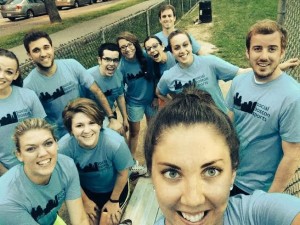
21 Companies In Boston Having Too Much Fun At Work

How To Answer “Do You Have Questions For Me?” (With Examples)
- Career Advice >
- Get The Job >
- How To Put Research On Resume Research Experience
- Search Search Please fill out this field.
- Career Planning
- Finding a Job
How To Use a Thesis Statement for Employment
:max_bytes(150000):strip_icc():format(webp)/ADHeadshot-Cropped-b80e40469d5b4852a68f94ad69d6e8bd.jpg)
What Is a Thesis Statement for Employment?
How a thesis statement for employment works, examples of a thesis statement for employment.
Think back to when you learned to write an essay. Most likely, your teacher talked about the importance of a thesis statement, which sums up your essay. A thesis statement can also be helpful during a job search.
Through a thesis statement, you can clarify your background as a candidate, what you want in a role, and how you'd fit in at a given company. This is, of course, valuable information for recruiters and hiring managers.
A thesis statement for employment is a brief description of yourself, your characteristics, and your skills.
Your thesis statement for employment is used to demonstrate your interest in a job and show how you would benefit an organization. Learn how to go about developing one.
Key Takeaways
- A thesis statement for employment is a brief description of yourself, your characteristics, and your skills. It’s used to show how you would benefit an organization.
- You can use your thesis statement on your resume, in cover letters, in interviews, and during networking events.
- A thesis statement should be brief, direct, and tailored to each position you apply for.
A thesis statement for employment is a one- or two-sentence statement of your qualifications.
Crafting this statement may take some time and thought. (That was likely true back when you were routinely writing essays, too.) Once you have developed a thesis statement, it'll come in handy at many points in your job search. You can use it:
- Within your cover letters —place your thesis statement in the first paragraph, where you explain why you're applying for the role.
- On your resume —include the thesis statement in your objective or summary section.
- During job interviews —to help explain why you're the right person for the job.
- When you're networking —with a thesis statement in mind, it's easy to respond when someone asks what type of job you want.
Your thesis statement should intrigue potential employers, so they want to learn more about you and your credentials. Keep in mind that your thesis statement should be dynamic, evolving to fit the needs of the role at hand.
The first step to developing your thesis statement is to think about the positions you want to apply for, what you have to offer a company, and why employers should hire you.
Here are some tips for developing a strong thesis statement:
- Be direct : Your thesis statement should be simple and to the point, as hiring managers don’t have time to figure out what you’re trying to say. This isn’t the time to show off your extensive vocabulary. The same strategies you used to craft an elevator pitch will come in handy when you're thinking through your thesis statement.
- Tailor your statement : Start by developing a general thesis statement, and then tweak it to target the job you're applying for. You may have an IT certification and also be a strong presenter, but if you're applying for a job as a computer technician, the IT certification is more important to mention. If you're applying for a position as a sales representative at a software company, you'll want to emphasize your presentation skills.
- Frame your skills as benefits to the company : One goal of a thesis statement is to make it readily apparent to a hiring manager how hiring you will be beneficial. For example, you might say that your management skills will help you develop and train an exceptional sales team that will meet or exceed company sales goals. You may need to research a company to find its goals and priorities.
A summary statement is similar to a thesis statement, but it focuses on factual experience without the emphasis on benefits. For example, you might say, "Executive assistant with seven years of experience maintaining schedules, arranging travel, and handling correspondence."
If you’re not sure what to include in your thesis statement, these examples can help:
- I'm writing to apply for the administrative assistant position at ABC company. My strong communication and organizational skills, and my ability to create order out of chaos make me an excellent match for this position.
- My fascination with numbers, combined with my strong accounting skills and mathematics minor, enables me to make a solid contribution in this role.
- My ability to successfully implement current web design technology, as well as develop and maintain sites for start-up IT companies, enables me to contribute to XYZ company.
- My fluency in Spanish and strong marketing and communication skills would be an asset to your company, allowing me to build trusting relationships with clients.
- I have created sales strategies that have achieved 40% revenue growth per year. I can motivate sales teams and design incentive programs to achieve short- and long-term sales goals.
The University of Arizona. " Writing a Thesis Statement ."
Chron. " Preparing a Thesis Statement Concerning a Job Interview ."
U.S. News. " What Is Your Job Fit Thesis ?"
jesustrainingcollege.com
Thesis Writing Guidelines
How to Put Your Thesis On Resume
For you to make your initial presence felt in the market place, you must have a strong resume. This is the document that goes out to your potential employers before they even meet you. This said the way you write and present your resume matters. It determines whether or not you will get the first chance to be heard. Including your thesis in your resume is considered important but the question is how to do it. Below are some guidelines on how to include thesis in resume:
Make The Decision On How To Add Thesis To Resume
A resume should not be a standard document that you just forward to any audience without a thought. Even though there are some aspects like personal biography and academic qualifications that may not change, you will need to edit it more than once. This is for the purposes of relevance. It also makes the audience acknowledge that you made efforts to customize it. Some of the things to consider before you decide to add your thesis to your resume are:
- Your target audience.
- The field to which you are applying for the job
- The particular position that you wish to secure as you apply
That said, the decision to include your thesis in your resume majorly depends on your application at a particular time. Remember to tailor your resume every time you make an application and delete the thesis part when it is not necessary.
Where And How To Put Thesis On Resume
Once you have decided that adding your thesis to your resume will make a difference, then you need to know exactly where and how to do it. A resume should be organized in a particular manner for it to get the necessary attention and bear the desired fruits. Placing one thing wrongly can make your resume look disorganized. That said, there is a need for you to know where to place your thesis. Below are a few tips on how to do the correct placement:
- Consider your Educational background and experience first and out them in a desirable order. Sometimes this is guided while other times you just make the decision based on your gut feeling.
- Put your thesis topic at the top of your Educational background sector
- Let your master’s and Bachelor’s degrees follow in that order where applicable
Most importantly even as you decide where to place your thesis, think about the whole resume impact it is going to have in your application. This, therefore, poses the challenge to create a catchy look and relevant information.
Title Placement
The issue of title placement comes after you have evaluated your target audience, position you are applying for and decided that you will have your thesis in your resume. Now, just to clarify, you will not need to put extra details of your thesis here. Avoid resume clumsiness by all means. Proper discretion is, therefore, necessary at this point. A few tips on how to place your thesis title correctly are:
- Put it beneath your doctorate’s main entry
- You can use italics depending on the style used in the whole document. The APA and MLA styles allow italics on the title
- Choose between indention and bullets just for the sake of highlighting
- Just in case your thesis has been published, you can indicate the publication citation after the title
The Details To Leave Out
If allowed and necessary, including your thesis in your resume is a great idea. Even so, there are some details from your thesis that are deemed unnecessary in your resume. Only a short summary of your thesis will do but with the exclusion of:
- The Abstract
- The members of your thesis committee
So now you know how to include thesis on resume. The above details might be allowed in your curriculum vitae but they are not appropriate in your resume. If you include them, you will be required to use titles and sometimes the people you worked with might not have any recognized titles. If you need thesis writing help, we advise you to check PhD dissertation service.
Whether or not to include your thesis on your resume depends on its relevance or lack of thereof. Consider the factors discussed here and if you decide to put it then do it right.
Leave a Reply Cancel reply
Your email address will not be published. Required fields are marked *
University of Missouri
- Bias Hotline: Report bias incidents
Undergraduate Research
How to put research on your resumé.
Resumés are important documents for all kinds of application packages — jobs, scholarships, grad school, etc. Your resumé should fit within the total package highlighting your achievements in a concise manner that can be further expounded upon in your personal statement, cover letter, or your letters of reference. It is important to custom tailor your resumé to any particular position, or program you are applying for. Some information needs to be emphasized more than other depending on what the reviewers may be looking for.
Using Your Space Wisely
In general, a resumé should be no more than two pages long — unless you have a large number of presentations or publications that need to be listed. Avoid the tendency to add more “stuff” to your resumé to try to look impressive. Use the relevant experience you have and determine what was impressive about it (for example, demonstrated independence, innovation, grit, or tenacity; helped improve ways of doing things in the lab; were given additional responsibilities as time went on; etc.)
- A reviewer would rather read about the two positions you had that are relevant, than try to sift through seven or eight clubs or fast-food job descriptions.
- Transcript?
- Recommendation Letters?
- Personal Statement?
Typically, resumes are formatted so that your most recent position is listed first. However, don’t put working at Dairy Queen first, if you are applying for a research position. Instead, consider using some of the following sections:
- Academic Accomplishments
- Research Experience
- Work Experience/Employment
- College Activities
- Volunteer Work
- Presentations and Publications
You do not need all of these categories, especially if you do not have relevant, interesting, or recent experience with them. Do not feel forced to try to fit your resume into someone else’s template. Make a list of what you want to include then design categories that fit your experience and story. Keep in mind that these categories will change over time (for example: five years after college, you will no longer need to include a section on “college activities”).
Research Mentor
- Area of research
- Not only does it show that you worked directly with a faculty member in your position, but reviewers might be familiar with your mentor’s work which could put you at an advantage.
- Consider listing projects and accomplishments the group achieved first before breaking things out on a year to year basis.
- If you were funded by different sources at different times, put a list of these sources at the bottom of the experience in this position.
Job Titles, Time Periods
- Use something that makes sense (sometimes HR titles do not)
- Instead of “MUURS Scholar” say “Student Researcher funded by the MU Undergraduate Research Scholars Program”
- Summer 2017 (9 weeks, full time internship)
- Academic Year 2018-2019 (15 hrs/week)
- What does that award mean?
- Will anyone outside of campus know what that is?
- Was the program selective?
- What was the award amount?
- What was the duration of the award?
- You can list various funding sources at the end of the relevant section
- External funding (from a government entity such as NIH, for example) is impressive. Be sure to list it.
You need to take the time to seriously consider your experience and how that allowed you to grow and mature as a researcher. Ask yourself these questions when brainstorming about your experience:
- What are areas you excelled in?
- What are lessons you learned?
- What are things you improved upon from the person before you?
- How did you spend your time?
- What skills did you gain?
- What research outcomes were reached?
- How long were you in the lab?
Use specific numbers or other qualifiers when applicable to show just how much work, effort, independence, or tenacity you had.
If your publication and presentation experience is limited, it is recommended that you include it with your relevant experience. However, if you have extensive or otherwise impressive experience (won a presentation award at a conference, or presented your work to state legislators at the Undergraduate Research Day at the the State Capitol, for example) then include a new category specifically for Presentations and/or Publications.
Presentations
- Include full list of authors
- Include full and official title
- Include if it was poster or oral presentation (ie, 15 minute presentation)
- Include location, event
- Include date (at least month and year)
- Include any award
- Check in with your mentor, to find out if a poster you co-authored was presented elsewhere.
Publications
- Full citation when published
- In Press – journal, date?
- Submitted for review – journal/date
- In preparation
- Check with your mentor as many projects are not completed by the time as student graduates.
Final Reminders
- Know your audience
- Explain (or spell out)
- Organize to fit your own situation
- Make it easy to follow – esp. if you have ‘time away’
- But have on comprehensive and cohesive running resumé.
- Have a system in place to update/organize your resumés.
- Use professional language, as most files are submitted electronically — the reviewer will see if you named a file “Better Resumé”
- ex: Jane Doe Resumé – Biochemistry REU, UT Austin
- This will ensure that the reviewer knows who you are and what you are applying for without even opening the file.
We encourage students to visit the MU Career Center in the Student Success Center for help on their specific application needs.
Internship and Career Center
Curriculum vitae.
Curriculum vitae (CV, also often informally called a “vita”) is a Latin expression loosely translated as "course of life”. In contrast to a resume (also resumé or résumé) from the French meaning “summary”.
Both a CV and resume represent you as the best qualified candidate, demonstrate your "fit" for a position, and are used in an application process to get you an interview. A CV presents a full history of your academic credentials so length is variable, while a resume presents a concise picture of your qualifications with length prescribed by years of experience. For more information on the differences between a CV and resume .
Many European countries use “CV” to describe all such documents and do not use the term resume. In the United Kingdom, most Commonwealth countries , and Republic of Ireland, for example, a CV is a short document, containing a summary of the job seeker's employment history, qualifications, education, and some personal information. Some parts of Asia also require applicants' photos, date of birth, and most recent salary information. When applying to international positions, be sure to check if you are unsure just what kind of information they want.
Check with your advisor about any discipline specific variations when preparing your CV.
When to use a CV
A CV is used when applying for:
- Graduate school
- Academic (research and teaching) positions in a four-year university, state college, community college, or liberal arts college
- Fellowships and scholarships
- Research funding and grants
Although largely the same format for all academic positions, there is some variation and a difference on emphasis for a CV depending on the type of institution you’re applying to (e.g. community college vs. four-year university).
Review discipline specific CV samples .
CVs for Undergraduates Applying to Graduate School
When applying to graduate school, the application instructions may request that a CV be included in your application packet. You can check with the admissions office at the institution you are applying to, but in general this request is not for a full CV, but rather a more comprehensive resume.
The graduate school application CV will still be no longer than 2 pages. Items to include on the graduate school application CV might include (if applicable):
- Descriptions of academic projects
- Presentations, posters, or publications
- Teaching assistantships
- Academic service, such as mentoring and/or leadership on committees
General tips and guidelines
See our CV/Resume builder to help you get started compiling your information.
General things to consider when developing your CV:
- Readability is important Reviewers will likely read 100s of applications. You want to make this as easy and painless as possible. Use 12 point font (or no smaller then 10). One inch margins (or no smaller then .8). Include a footer starting on the second page with your name and "page 2 of X". See CV samples for footer options.
- Briefly highlight your dissertation or thesis in the Education section When describing your dissertation or thesis in a CV, you typically include the title within the Education section included just under the degree. The details of the work will be include later within the Research Experience section. For those in the Humanities, you will add a Dissertation section with a brief synopsis of your research. See Humanities CV sample .
- Include common CV sections The header with contact information ( see header samples ), Education, Research Experience, Teaching Experience, Publications, Presentations, Grants and Awards, Academic Service (could include mentoring, committee work, journal editing), and References. See additional CV categories for further explanation. Also see CV samples for formatting and layout.
- Use paragraphs instead of bullets When describing your experience a CV generally uses a paragraph structure, compared to a resume which is typically formatted using bullet points. The emphasis for a CV is on academic accomplishment, research inquiry, methods or techniques used, and analytical approaches. A CV could include names of collaborators and your PI, research outcomes or future areas of inquiry. Skills and abilities are also included in a CV. Those skills particular to graduate students and postdocs include the ability to analyze data, conduct archival research, test hypothesis, and reason logically. For additional suggestions and a list of skills, view the CV supplement .
- Include a reference section A Reference section is typically included when applying for a faculty or postdoc position. Follow the instructions. If the position description calls for three references, provide them with three. Be sure to include the name, department, email, address and phone number. Referees for academic appointments generally send the reference letter directly to the institution, so you will want them to know exactly how to contact your references in case the letter does not arrive.
Emphasis Depends Upon the Institution
A CV for an academic teaching position in a:
- Community College Emphasizes teaching over research, pedagogical training and qualifications as a generalist as well as academic service, mentoring and work with undergraduate students. The Teaching Experience section on your CV will follow the Education section and include details about your particular role (e.g., Adjunct, Lead Teaching Assistant, Teaching Assistant) as well as a list of all of the courses (by course title, not course number) you have taught or supported. The Teaching Experience section may include lecture materials you have presented, class size, lab responsibilities, etc. Teaching-focused community college CVs may also have a research section, but will include limited detail. See community college CV sample .
- State or Liberal Arts College Emphasizes a balance of teaching and research, thus will include equal emphasis on the research and teaching sections.
- Four-Year University Emphasizes academic accomplishments, scholarly productivity, research experience, technical expertise, successful grant writing and collaboration potential. The emphasis for a tier one research institution will be placed on the research section, with a less prominent section on teaching and mentoring experience. The Research Experience section should follow the Education Section.
Jump to navigation
Search form

The Graduate School
- Faculty/Staff Resources
- Programs of Study Browse the list of MSU Colleges, Departments, and Programs
- Graduate Degree List Graduate degrees offered by Michigan State University
- Research Integrity Guidelines that recognize the rights and responsibilities of researchers
- Online Programs Find all relevant pre-application information for all of MSU’s online and hybrid degree and certificate programs
- Graduate Specializations A subdivision of a major for specialized study which is indicated after the major on official transcripts
- Graduate Certificates Non-degree-granting programs to expand student knowledge and understanding about a key topic
- Interdisciplinary Graduate Study Curricular and co-curricular opportunities for advanced study that crosses disciplinary boundaries
- Theses and Dissertations Doctoral and Plan A document submission process
- Policies and Procedures important documents relating to graduate students, mentoring, research, and teaching
- Academic Programs Catalog Listing of academic programs, policies and related information
- Traveling Scholar Doctoral students pursue studies at other BTAA institutions
- Apply Now Graduate Departments review applicants based on their criteria and recommends admission to the Office of Admissions
- International Applicants Application information specific to international students
- PhD Public Data Ph.D. Program Admissions, Enrollments, Completions, Time to Degree, and Placement Data
- Costs of Graduate School Tools to estimate costs involved with graduate education
- Recruitment Awards Opportunities for departments to utilize recruitment funding
- Readmission When enrollment is interrupted for three or more consecutive terms
- Assistantships More than 3,000 assistantships are available to qualified graduate students
- Fellowships Financial support to pursue graduate studies
- Research Support Find funding for your research
- Travel Funding Find funding to travel and present your research
- External Funding Find funding outside of MSU sources
- Workshops/Events Find opportunities provided by The Graduate School and others
- Research Opportunities and programs for Research at MSU
- Career Development Programs to help you get the career you want
- Teaching Development Resources, workshops, and development opportunities to advance your preparation in teaching
- Cohort Fellowship Programs Spartans are stronger together!
- The Edward A. Bouchet Graduate Honor Society (BGHS) A national network society for students who have traditionally been underrepresented
- Summer Research Opportunities Program (SROP) A gateway to graduate education at Big Ten Academic Alliance universities
- Alliances for Graduate Education and the Professoriate (AGEP) A community that supports retention, and graduation of underrepresented doctoral students
- Recruitment and Outreach Ongoing outreach activities by The Graduate School
- Diversity, Equity, and Inclusion Funding Funding resources to recruit diverse students
- Graduate Student Organizations MSU has over 900 registered student organizations
- Grad School Office of Well-Being Collaborates with graduate students in their pursuit of their advanced degree and a well-balanced life
- Housing and Living in MI MSU has an on and off-campus housing site to help find the perfect place to stay
- Mental Health Support MSU has several offices and systems to provide students with the mental health support that they need
- Spouse and Family Resources MSU recognizes that students with families have responsibilities that present challenges unique to this population
- Health Insurance Health insurance info for graduate student assistants and students in general at MSU
- Safety and Security MSU is committed to cultivating a safe and inclusive campus community characterized by a culture of safety and respect
- Why Mentoring Matters To Promote Inclusive Excellence in Graduate Education at MSU
- Guidelines Guidelines and tools intended to foster faculty-graduate student relationships
- Toolkit A set of resources for support units, faculty and graduate students
- Workshops Workshops covering important topics related to mentor professional development
- About the Graduate School We support graduate students in every program at MSU
- Strategic Plan Our Vision, Values, Mission, and Goals
- Social Media Connect with the Graduate School!
- History Advancing Graduate Education at MSU for over 25 years
- Staff Directory
- Driving Directions
CV Formatting Essentials

In general, the main thing to consider when developing your CV is readability. It is important because reviewers will likely read 100s of CVs for applications. Therefore you want to make this as easy and painless as possible. The following are just a few tips we think will help you get started.
- To start, make sure to use 12 point font (or no smaller then 10) and one inch margins (or no smaller then 8)
- The following are some common sections found in a CV:
- Publications
- Presentations
- Professional or Work Experience
- Community or Academic Service
- Honors & Awards
- When describing your experience a CV generally uses a paragraph structure, compared to a resume which is typically formatted using bullet points.
- The emphasis for a CV is on academic accomplishment, research inquiry, methods or techniques used, and analytical approaches.
- Briefly highlight your dissertation or thesis in the Education section. When describing your dissertation or thesis in a CV, you typically include the title within the Education section included just under the degree. The details of the work will be include later within the Research Experience section. For those in the Humanities, you will add a Dissertation section with a brief synopsis of your research. See Humanities CV sample .
- A CV could include names of collaborators and your PI, research outcomes or future areas of inquiry. Skills and abilities are also included in a CV. Those skills particular to graduate students and postdocs include the ability to analyze data, conduct archival research, test hypothesis, and reason logically.
- Include a reference section. A Reference section is typically included when applying for a faculty or postdoc position. Follow the instructions. If the position description calls for three references, provide them with three. Be sure to include the name, department, email, address and phone number. Referees for academic appointments generally send the reference letter directly to the institution, so you will want them to know exactly how to contact your references in case the letter does not arrive.
- Include a footer starting on the second page with your name and "page 2 of X".

- Call us: (517) 353-3220
- Contact Information
- Privacy Statement
- Site Accessibility
- Call MSU: (517) 355-1855
- Visit: msu.edu
- MSU is an affirmative-action, equal-opportunity employer.
- Notice of Nondiscrimination
- Spartans Will.
- © Michigan State University
Have a language expert improve your writing
Run a free plagiarism check in 10 minutes, generate accurate citations for free.
- Knowledge Base
- How to Write a Thesis Statement | 4 Steps & Examples
How to Write a Thesis Statement | 4 Steps & Examples
Published on January 11, 2019 by Shona McCombes . Revised on August 15, 2023 by Eoghan Ryan.
A thesis statement is a sentence that sums up the central point of your paper or essay . It usually comes near the end of your introduction .
Your thesis will look a bit different depending on the type of essay you’re writing. But the thesis statement should always clearly state the main idea you want to get across. Everything else in your essay should relate back to this idea.
You can write your thesis statement by following four simple steps:
- Start with a question
- Write your initial answer
- Develop your answer
- Refine your thesis statement
Instantly correct all language mistakes in your text
Upload your document to correct all your mistakes in minutes

Table of contents
What is a thesis statement, placement of the thesis statement, step 1: start with a question, step 2: write your initial answer, step 3: develop your answer, step 4: refine your thesis statement, types of thesis statements, other interesting articles, frequently asked questions about thesis statements.
A thesis statement summarizes the central points of your essay. It is a signpost telling the reader what the essay will argue and why.
The best thesis statements are:
- Concise: A good thesis statement is short and sweet—don’t use more words than necessary. State your point clearly and directly in one or two sentences.
- Contentious: Your thesis shouldn’t be a simple statement of fact that everyone already knows. A good thesis statement is a claim that requires further evidence or analysis to back it up.
- Coherent: Everything mentioned in your thesis statement must be supported and explained in the rest of your paper.
Here's why students love Scribbr's proofreading services
Discover proofreading & editing
The thesis statement generally appears at the end of your essay introduction or research paper introduction .
The spread of the internet has had a world-changing effect, not least on the world of education. The use of the internet in academic contexts and among young people more generally is hotly debated. For many who did not grow up with this technology, its effects seem alarming and potentially harmful. This concern, while understandable, is misguided. The negatives of internet use are outweighed by its many benefits for education: the internet facilitates easier access to information, exposure to different perspectives, and a flexible learning environment for both students and teachers.
You should come up with an initial thesis, sometimes called a working thesis , early in the writing process . As soon as you’ve decided on your essay topic , you need to work out what you want to say about it—a clear thesis will give your essay direction and structure.
You might already have a question in your assignment, but if not, try to come up with your own. What would you like to find out or decide about your topic?
For example, you might ask:
After some initial research, you can formulate a tentative answer to this question. At this stage it can be simple, and it should guide the research process and writing process .
Now you need to consider why this is your answer and how you will convince your reader to agree with you. As you read more about your topic and begin writing, your answer should get more detailed.
In your essay about the internet and education, the thesis states your position and sketches out the key arguments you’ll use to support it.
The negatives of internet use are outweighed by its many benefits for education because it facilitates easier access to information.
In your essay about braille, the thesis statement summarizes the key historical development that you’ll explain.
The invention of braille in the 19th century transformed the lives of blind people, allowing them to participate more actively in public life.
A strong thesis statement should tell the reader:
- Why you hold this position
- What they’ll learn from your essay
- The key points of your argument or narrative
The final thesis statement doesn’t just state your position, but summarizes your overall argument or the entire topic you’re going to explain. To strengthen a weak thesis statement, it can help to consider the broader context of your topic.
These examples are more specific and show that you’ll explore your topic in depth.
Your thesis statement should match the goals of your essay, which vary depending on the type of essay you’re writing:
- In an argumentative essay , your thesis statement should take a strong position. Your aim in the essay is to convince your reader of this thesis based on evidence and logical reasoning.
- In an expository essay , you’ll aim to explain the facts of a topic or process. Your thesis statement doesn’t have to include a strong opinion in this case, but it should clearly state the central point you want to make, and mention the key elements you’ll explain.
If you want to know more about AI tools , college essays , or fallacies make sure to check out some of our other articles with explanations and examples or go directly to our tools!
- Ad hominem fallacy
- Post hoc fallacy
- Appeal to authority fallacy
- False cause fallacy
- Sunk cost fallacy
College essays
- Choosing Essay Topic
- Write a College Essay
- Write a Diversity Essay
- College Essay Format & Structure
- Comparing and Contrasting in an Essay
(AI) Tools
- Grammar Checker
- Paraphrasing Tool
- Text Summarizer
- AI Detector
- Plagiarism Checker
- Citation Generator
A thesis statement is a sentence that sums up the central point of your paper or essay . Everything else you write should relate to this key idea.
The thesis statement is essential in any academic essay or research paper for two main reasons:
- It gives your writing direction and focus.
- It gives the reader a concise summary of your main point.
Without a clear thesis statement, an essay can end up rambling and unfocused, leaving your reader unsure of exactly what you want to say.
Follow these four steps to come up with a thesis statement :
- Ask a question about your topic .
- Write your initial answer.
- Develop your answer by including reasons.
- Refine your answer, adding more detail and nuance.
The thesis statement should be placed at the end of your essay introduction .
Cite this Scribbr article
If you want to cite this source, you can copy and paste the citation or click the “Cite this Scribbr article” button to automatically add the citation to our free Citation Generator.
McCombes, S. (2023, August 15). How to Write a Thesis Statement | 4 Steps & Examples. Scribbr. Retrieved April 15, 2024, from https://www.scribbr.com/academic-essay/thesis-statement/
Is this article helpful?
Shona McCombes
Other students also liked, how to write an essay introduction | 4 steps & examples, how to write topic sentences | 4 steps, examples & purpose, academic paragraph structure | step-by-step guide & examples, what is your plagiarism score.

IMAGES
VIDEO
COMMENTS
Example of how to add your thesis information Here's an example of how you can add your thesis information to your resume: EDUCATION Ph.D., Microbiology, 2017 - 2019 University of Minnesota, Twin Cities Thesis topic: "Antibiotic resistance: How drug misuse in livestock farming is affecting human health." Supervisor: Prof. S. Santos This study explores the complex relationship between ...
Learn more about how ResumeSolution can make your application stand out. 1. Include a Thesis in Resume Education Section. We will start the list with the most common method people use for adding a thesis to their resume. The education section is the ideal place to add a piece of information like this.
The thesis also refers to an academic project that a doctoral candidate completes in pursuit of their professional qualification. We'll focus on that usage today, looking at how to add this project to a resume. In this article, you'll learn. When it's appropriate to add a thesis to a resume; Examples; Tips on adding your thesis to a resume
In the "Education" section of your resume, list the schools you've attended in reverse chronological order. Start with the name of the institution, followed by the degree you earned and the area or subject you specialized in. If you're trying to save space, type "Thesis:" on the same line, and then include the title of your master's thesis. If ...
Every resume and cover letter you write should be tailored to the job you're applying for. When a hiring manager puts a necessary qualification in their job posting, you must be sure to include it in your resume. Make sure that you highlight the right types of research skills on your job applications and resumes. Quantify your accomplishments.
How to put research on your resume. Follow these steps to add research skills to your resume: 1. Review the job description. Start by reviewing the job description closely and identifying whether the employer is looking for specific types of research skills. Make a list of all of the research-related skills they're looking for in a candidate. 2.
Thesis: A completed thesis is definitely an accomplishment worth showing off, particularly if the subject matter is relevant to the industry you're applying to work in. Relevant coursework: Including relevant coursework on your resume shows employers that you have foundational knowledge in your field and skills to build upon.
A thesis statement for employment is a brief description of yourself, your characteristics, and your skills. It's used to show how you would benefit an organization. You can use your thesis statement on your resume, in cover letters, in interviews, and during networking events.
List the publications in bullet points, including the title, date, and journal name. You can list academic publications more formally if you're applying to graduate school or seeking a role in academia. Related: Create a Resume Publications Section in APA and MLA. 6. Highlight research skills in the skills section.
Put them in a separate resume section called "Publications.". Add your publications section below your education. Include each publication in a new bullet point. List the year and title. Add the name of the magazine, website, or journal. Stick with publications that show required skills.
A resume is a concise and informative summary of your education, training, experiences, skills and accomplishments ... dissertation thesis, academic honors and awards. Experience - You can organize your experience with different headings that make it easier for an employer to identify relevant skills and experience, e.g. "Public Health ...
Avoid resume clumsiness by all means. Proper discretion is, therefore, necessary at this point. A few tips on how to place your thesis title correctly are: Put it beneath your doctorate's main entry. You can use italics depending on the style used in the whole document. The APA and MLA styles allow italics on the title.
Create a dedicated section. Add a component to your resume page titled "Publications.". Use reverse chronological order. List each publication as its own bullet point, starting with the most recently published. Choose only the most recent and relevant publications to avoid taking up valuable space on your resume.
Since the CV is often lengthy and more detailed than a resume, it is helpful to include a section that summarizes your most important skills and accomplishments. This can be written in paragraph or bullet-point format but should be limited to one concise paragraph or 5 bullet-points. Education (Include your thesis information
Know your audience. Quantify. Explain (or spell out) Organize to fit your own situation. Make it easy to follow - esp. if you have 'time away'. Update regularly and start leaving some irrelevant and less impressive things off! But have on comprehensive and cohesive running resumé. Have a system in place to update/organize your resumés.
Check back periodically for new content. Curriculum vitae (CV, also often informally called a "vita") is a Latin expression loosely translated as "course of life". In contrast to a resume (also resumé or résumé) from the French meaning "summary". Both a CV and resume represent you as the best qualified candidate, demonstrate your ...
Thesis title: "The Lesbianism of Marcel Proust: ... For some great teacher resume examples, see our guides: Teacher Resume: Sample & Complete Guide [20+ Examples] or Teaching Assistant Resume: Sample and Complete Guide [20+ Examples] 10. Research Experience. This is where you list all your academic research posts. As per usual—enter them in ...
When describing your experience a CV generally uses a paragraph structure, compared to a resume which is typically formatted using bullet points. The emphasis for a CV is on academic accomplishment, research inquiry, methods or techniques used, and analytical approaches. Briefly highlight your dissertation or thesis in the Education section.
@AlixBlaine - the last resume I put together was one page, excluding the list of publications. I'm likely never writing another one before retiring, but I hate long resumes that don't focus on the job one is applying for. I say that as someone who regularly hires for PhD staff and other positions. An undergraduate should have a one page resume.
GPA: 8.49/10. Skills. Work History. 2016 to Current Graduate Student, Master's thesis University Of Massachusetts Medical School | Boston, MA, USA. Studied the kinetics of mutarotation in glucose using Lewis acid catalysts. Utilized the concept of Reaction Induced Difference Infrared Spectroscopy for homogeneous catalysis. 06/2014 to 03/2015 ...
Step 2: Write your initial answer. After some initial research, you can formulate a tentative answer to this question. At this stage it can be simple, and it should guide the research process and writing process. The internet has had more of a positive than a negative effect on education.
Check Out one of our best thesis student resume samples with education, skills and work history to help you curate your own perfect resume for thesis student or similar profession. LiveCareer-Resume. Builders. Resume Builder. Create a professional-level resume with ease. 30+ dazzling design options!
Experience. 07/2016 Undergraduate Thesis Student Bass Pro Shops. Attend and participate in lab meetings with peers and mentors. Participate in scientific paper and personal development discussions. Maintain effective communication with mentor. Review video data for nest behavior and depredation. Create research objectives.